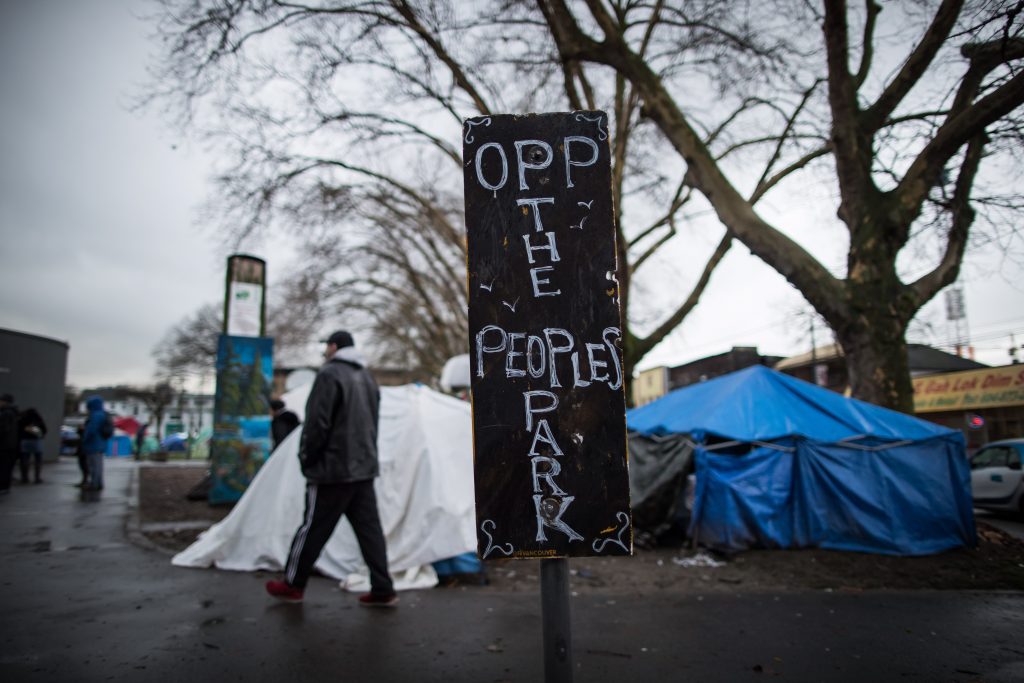The mayor of Vancouver says he’s doing what he can to address the growing homeless camp in Oppenheimer Park — but it requires housing and for the campers to eventually be able to pay rent.

Speaking to CKNW’s Lynda Steele Wednesday, Kennedy Stewart said he’s working on the housing plan while the Vancouver Park Board continues to explore a long-term strategy for clearing the camp.
“I did offer that the city would take that over so we could use all the resources we have to offer solutions, and that wasn’t taken up,” he said, referring to conversations he had with the park board late last year.
“We’re working around that, and what I’m working on is a pathway out for people.”
That “pathway” includes getting the campers into temporary modular housing units, 58 of which will be opening up next month at a facility on Copley Street in East Vancouver.
After that, Stewart says he wants the campers to transition into units approved under the city’s new moderate income housing pilot program, which sets rents at $950 per month for a bachelor studio.

“It’s affordable for someone making $20 an hour or for two people making minimum wage,” he said.
“Then what we hope is as people get stabilized and their incomes increase, they can start moving towards market housing.”

Get daily National news
Stewart said a vast majority of homeless people in Vancouver are on social assistance, which would allow them to afford modular housing at shelter rates. He added he’s “very close” to securing provincial and federal funding for several more of those units.
The mayor pointed to 63 units that will operate under the moderate income plan, which were approved in December and have not yet broken ground.
Stewart acknowledged some of those with addiction and mental health issues will require extra assistance, saying that could be covered by the federal government’s own plans to cut homelessness in half by 2027.
But Ivan Drury with Alliance Against Displacement said the idea that anyone living in Oppenheimer would be able to afford Stewart’s plan is “laughable.”
“The people who are in the tents in Oppenheimer Park are either working irregular under the table, or very part-time jobs, or they’re on regular welfare,” he said.
“People in those conditions will never be able to afford $950/month bachelor suites. And certainly not in a sustainable way.”

Drury said having two people living together in a bachelor suite would not only prove dangerous for vulnerable women in abusive relationships, but could also be used as an excuse for landlords to evict tenants down the road for over-occupancy.
“Really what it does is provide a political cover to the shortfalls at all levels of government,” he said. “All levels of government are failing people who are stuck sleeping out on the streets.”
The fate of those living in Oppenheimer Park has been an open question for months, with the Vancouver Park Board refusing to approve an injunction against the more than 100 campers.
Over a hundred other people used to live in the camp until last summer, when the park board requested people move into single-room occupancy housing that had been made available for them.
Those campers took the city up on the offer, while the rest refused to move and the camp began to grow again.
Since then, the park board voted in favour of finding a solution through Indigenous reconciliation in collaboration with the city that seeks housing supports first.
The urgency hasn’t appeared to increase with the death of 62-year-old Jesus Cristobal-Esteban, who succumbed to injuries sustained in an assault in the park on New Year’s Day.

The board sent out a media release hours before their meeting Monday, saying that it was in the “final stages” of securing a third party to help facilitate a “decampment” of the park.
Campers and activists in the park argue existing housing and shelter space being offered by the city’s outreach teams is not adequate and doesn’t address the needs of campers who are elderly, disabled or suffering from mental health issues.
Stewart later said his housing plan is not just for the people living in Oppenheimer Park, and that they wouldn’t get first crack at the new units.
“I think if I were to just focus on Oppenheimer that would be a little bit irresponsible of me,” he said.
“There’s lots of people in need. The last homeless count put us at 2,200 people.”
But the mayor said the future of the park hasn’t left his sight, despite being able to do little to step in.
“It’s not like I’m sitting back and watching Oppenheimer happen,” he said. “We can’t stray into park board’s jurisdiction, but if they want to turn it over to us we’re more than happy to take that and move in.”









Comments
Want to discuss? Please read our Commenting Policy first.